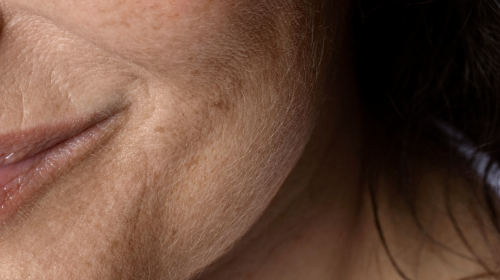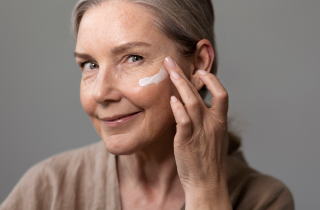How to Keep Your Skin Healthy in Older Age
As we age, our skin changes rapidly- it becomes thinner, drier, and more susceptible to a variety of conditions. Skin care for seniors is critical not only for cosmetic reasons, but more importantly for their overall health and well-being. Proper skin care can help prevent skin discomfort, infections and other complications. Here are a few useful tips to ensure healthy skin in old age.
What is Aging Skin?
As we age, our skin produces less oil, resulting in a dry skin syndrome. This skin condition, also called xerosis, is often common in the elderly who often complain about itching and impaired skin integrity, which heightens their risk for skin injuries and infections.

Essential elderly skin care tips
- Gentle Cleansing: Select a gentle, fragrance-free cleanser that is marketed as a facial cleanser as these generally do not strip skin oils. Avoid the use of hot water remember to use a short, lukewarm classic bath, or sponge bath and to keep bathing times as short as feasible, to decrease overall dryness.
- Moisturize Regularly: Apply a thick, fragrance-free moisturizer immediately after bathing to lock in hydration. Choose a product with ceramides, hyaluronic acid, or glycerin since these ingredients are well known to hydrate the skin.
- Sun Protection: Apply daily a broad-spectrum sunscreen with an SPF of 30 or greater. Prolonged exposure to the sun promotes skinaging and increases the risk of skin cancers.
- Hydration and Nutrition: Adequate hydration directly affects our skin health. Similarly, a well-balanced diet that includes vitamins A, C, E and omega-3 fatty acids are also very beneficial for the skin. Dark green vegetables, nuts and fatty fish are great options.
- Avoiding Irritants: Stay away from products that contain alcohol, fragrance or irritating chemicals, as they can aggravate dryness and irritation issues.
Dealing with Common Skin Problems in the Elderly
- Dry Skin: Xerosis: Using emollients regularly can help alleviate dry skin, for very dry skin or advanced xerosis, consult your dermatologist for possible prescription treatment.
- Skin Infections: Proper hygiene, treating cuts and/or abrasions immediately and monitoring for infection symptoms are key. The skin should be checked on a routine basis to identify signs of infection sooner rather than later.
- Pressure Ulcers: For the immobile, it is paramount to change position, using pressure relief devices, and assess their skin regularly to prevent pressure sores.
Utilizing Home Remedies
- Home remedies are valued and often incorporated alongside conventional aging skin care routines.
- Aloe Vera. Aloe vera is soothing for dry or irritated skin; therefore it can be used to manage numerous skin conditions.
- Coconut Oil. Coconut oil can be very useful because it is oily and anti-inflammatory.
- Oatmeal Baths. Adding colloidal oatmeal to bath water can help alleviate itching and inflammation of the skin.
Note: Always do a patch test, prior to trying anything new, to make sure there is no allergy to it.
Developing a Daily Skin Care Routine
Establishing a daily skin care routine is essential. You can do this easily, if you make it a simple habit:
In the morning:
- Gentle cleanse
- Moisturizer
- SPF sunscreen
In the evening:
- Gentle cleanse
- Thicker moisturizer (night cream)
- You may also want to add products with retinoids or peptides to your skincare routine to help reduce fine lines and improve skin texture. These are some of the best skincare products for the elderly.
Conclusion
In summary, healthy skin in old age takes an understanding of basic skin habits, nutrients, and careful attention to identify potential problems related to skin. By following these simple strategies and focusing on your skin care habits, our skin should remain resilient and comfortable to significantly increase quality of life.
Contact the HHA unit at Angel Care Inc., NY for personalized skin care advice and guidance. We are here to support your health in any way we can.

As we get older, we definitely will go through many life transitions—retirement, physical health challenges, the death of friends/family, and cognitive decline. Each one of these transitions, whether emotional, psychological, or social, will profoundly affect the mental health of older adults. In many cases, these changes may feel completely overwhelming, and they struggle to manage. The good news is that psychotherapy for older adults can be an effective way to manage these transitions. But how do you know when the time is right to seek therapy, and what can psychotherapy give the elderly? What You Need to Understand About Psychotherapy for Seniors Psychotherapy, also called mental health therapy for older adults, is when an older adult has sessions with a trained therapist, a specialized unit, or clinician to address the emotional, psychological, or behavioral challenges the older adult may experience. Psychotherapy gives essential support to older adults as they transition through a major life transition, such as grief, abandonment, depression, anxiety, and/or the limitation of old age. Just like we frequently check on our physical health, we should equally assess our mental health in the later years of our life. When to See a Psychotherapists for Seniors Determining when to see a psychotherapist for seniors can be a complex matter. Many older adults may not wear their emotions on their sleeves, which makes it difficult for skilled services caregivers / loved ones to know what the elder adult might be feeling and knowing when therapy is needed. Sadness, anxiety or depression may still be present but unexpressed. In addition, some elderly individuals may not even know that they are additional suffering from what they believe is simply "normal aging." Regardless, therapy in old age can improve ones overall mental health and fully boost the ability to adversely function. If you think psychotherapy may help your loved one, yet are unsure, think about whether the below key indicators could suggest help is needed: Persistent Sadness/Depression: Although it is not out of the realm to be a little sad, since everyone could probably consider times of feeling sad, if feelings of sadness persist and have - at times - possible included feelings of hopelessness, then it is possible there are depressive factors at play. Anyone can experience depressive symptoms at any age, and it is not uncommon to do so among older adults, specifically in the context of major changes, such as loss of partner, or even chronic health concerns. Difficulty Adjusting To Life Changes: Major life changes such retirement, moving into assisted living, and or medical changes have been noted to take an emotional toll on an elderly persons overall well-being. If an elderly person has difficulty adapting to these changes, therapy may possibly provide them with adaptive skills to improve their coping mechanisms. Social Isolation: Almost every person will experience some level of social isolation and restrictions late in life. While some people may simply just have low levels of social engagement, the use of public health restrictions may be scapegoats for elderly social isolation. On the other hand, to add to greater issues for elderly persons, if they are actually feeling lonely and isolated, the present issues can cause additional stress and burden on unrelated mental health safety nets. Counseling services for elderly people could promote some re-engagement as previously established safety net, but may create a return to the present or previously established social network. All-Up Anxiety and Fear: As we age we reach periods of fear, for example: fear of death, loss of independence, or significant illness. Similarly, anxiety disorders in elderly persons may present themselves for the first time, or grow worse at times of life transition. Psychotherapy can be a useful support for seniors as they navigate these feelings and achieve comfort in their lives. Sleep Concerns: Chronic sleep disturbances, especially those related to stress, anxiety, or worries about others, can negatively impact overall health. Psychotherapy for older adults can help identify the emotional factors related to sleep and begin to address the issues. Name cognitive decline: Memory problems, confusion or difficulty with attention in older adults, may be early signs of dementia or other cognitive issues. Therapy can facilitate processing the emotional aspects of cognitive decline, along with the development of coping strategies. The Many Values of Therapy for Older Adults There are many values associated with older adults experiencing mental health challenges to have therapy. Some of the benefits of therapy, include: Improved Emotional Health: Therapy can guide older adults in dealing with challenging feelings, difficult memories or loss. As a result, improved emotional regulation can lead to improved mental health over time. Increased Quality of Life: Working through mental health challenges can improve the overall quality of life for older adults. When emotional issues are addressed, it is common for seniors to have improved physical health, relationships and sense of purpose. More Productive Cognitive and Behavioral Strategies: Psychotherapy can help older adults develop more productive cognitive and behavioral strategies. For instance, seniors who have memory issues or dementia can learn coping strategies that allow them to be more independent with some level of confidence. For example, older adults with memory issues or dementia can learn coping strategies that make them feel more independent and confident. The older adults that have the ability to learn new coping strategies, would gain use of their self-determination. Decreased Anxiety: Therapy offers older adults a safe place to unpack their concerns and anxieties. Simply discussing concerns and issues can help provide some comfort and relief of stress, which also could reduce anxiety and provide an overall physical improvement as well. Improved Relationships: Therapy can improve more than just mental health, but can assist with the task of improving communication and resolving relationship conflict (whether with family members or caregivers). How to Start Therapy for Seniors? To some older adults, the thought of going to therapy may seem overwhelming. They may believe that therapy is only for those who have serious mental health problems or that it is too late in their lives to make any improvements through therapy. The unique aspect of therapy is that it is never too late for anyone to start therapy. It can be an excellent tool to improve the mental health of older adults. After careful consideration of therapy for an elderly loved one, the first steps are outlined below to assist in the process: Discuss with a Medical Professional: If you or a loved one is experiencing emotional wellness concerns, it may be beneficial to start the conversation with a primary care doctor, to evaluate if therapy can help. They will be able to evaluate the situation, and if considered appropriate, have providers to refer. Research a Geriatric Therapist: If you determine to pursue therapy for that older adult, then important consideration is to ensure you are finding a therapist who specializes in geriatrics. Geriatric therapy may allow the older adult to work with professionals who have experience working with an older adult population. You may be able to find some strategies that will address the unique challenges encountered by older adults. Gather Current or Supportive Treatment Options: There are various forms of therapy that may be appropriate for an older adult, such as cognitive behavioral therapy (CBT) or group therapy, and even art therapy. Do work collaboratively with the therapist to determine which may be the most effective for treatment. Family Support: Family members can sometimes be the most important motivators to get seniors to receive treatment. With the involvement of family members, the process can be less scary, and they can be supportive. Elderly Mental Health Assistance: A Critical Component of Aging Well As important as the physical well-being of our elderly loved ones, is to equally consider their mental well-being. Seeking a therapy for the elderly can be an important step to maintaining independence, managing emotional wellness, and overall well-being. Professional therapy is a holistically intended approach to aging, allowing the elderly to process life changes, transitions, and stressors at/throughout all stages of aging. At Angel Care Inc. homecare services unit, we understand the importance of mental health for the elderly. If you or your loved one are having emotional concerns, or are looking for mental health assistance, we can assist by offering therapy and compassionate care. We strive to provide elderly mental health support to aid the elderly in aging happily and healthily and with dignity. If you are unsure about therapy for your elderly loved one, it is possible and could be beneficial to get to know a mental health professional, who can speak to you about the mental health outcomes of elderly adults using therapy in their later years.

In a healthcare environment constantly shifting & changing, one profession stands out in its ability to help restore dignity and improve wellbeing for older adults: geriatric nursing. Geriatric nurses (often referred to as gerontological nurses) may work in long-term care facilities or hospitals, but they often work from home, operating behind the scenes and, at times, out of sight altogether. Nurse is not their only title; they are educators, advocates, and companions with a keen and instinctive awareness of the ethereal med./emotional needs of our aging population. So, where does a geriatric nurse fit in and what is it, exactly? And to what extent do geriatric nurses contribute to nursing care of older adults in the home setting? A Specialist When You Need Compassionate Precision A geriatric nurse is a licensed nurse with more than entry-level training in the physiological, psychological, and social dimensions of aging. They have functional responsibilities that go beyond typical nursing intervention; they act as a support/message center in a fragile web of support to help ensure older patients can be safe and healthy in their everyday lives. Whether the geriatric nurse is learning about medication compliance, recognizing subtle changes in cognition, or coordinating care delivery from many providers, they bring clinical precision and compassion into their work. Geriatric nursing is an even larger distinction (given the nature of home health care) to the extent to which they help promote aging at home. Geriatric nurses support patients and their families in and around the home and work with the system to provide care for patients in ways that are unique and meaningful for older adults, perhaps not found in assisted living or a hospital (not always meant positively). The geriatric nurse is sensitive to the rhythms of the home, developing rapport in such a manner that they are often a trusted presence not only with the patient but also to the family members who are negotiating the sometimes emotional landscape of aging. Geriatric nurse duties in home care are as varied as the people they serve. The geriatric nurse may begin the morning doing vitals and assessing mobility, in the afternoon prepare a meal and supervise mental health, and in the evening nurse a pain management plan. Each of these actions would be reflected upon from a broad understanding of geriatric syndromes (e.g. fall risks, dementia disorders, etc.) and the ability to take action, when needed. Communicating is also an important component of the geriatric nurse's role; they help provide family caretakers with meaningful language about a patient's care to leverage the knowledge base of family members. The geriatric nurse listens, and listens hard, to a patient's fears, frustrations, and goals. They validate the tale of growing old, while insuring a sense of autonomy. Enhancing Quality of Life by Geriatric Home Health Care At Angel Care Inc., we have seen the changes that geriatric nurses have made by turning home spaces into areas of healing and comfort. The skilled nursing of our seniors is not purely made up of professional assessment of vitals and medications, it includes advocacy also - toward resilience and dignity. It insists our client's best twilight years are filled with peace, safety and fulfillment, not grim acquiescence. In a time where fast-paced living overplays older adults as an afterthought, geriatric home health care not only provides a new lens of examination, it aggressively affirms that older adults are again placed 'in the center of the story'. Geriatric nurses approach their role holistically, and provide not only medically-informed support, but also a bridge between the associated bureaucracy of health care and personalized informality of life at home. Quiet Heroism Deserving of Recognition Understanding the role of a geriatric nurse within infrastructure of home care means one has some appreciation of the quiet heroism that unfolds on a daily basis. The geriatric nurse embodies the concept of persistence and a service who holds and secures aging individuals with presence and worth. At Angel Care Inc., we are able to support these strong and worthy individuals, integrate new geriatric nurses into our home care team, and empower nursing care for seniors at home to be not just present, but also individualized, expertly delivered, and respected. If you or a loved one may benefit from drawing upon the insight and expertise of a geriatric nurse, we would encourage you to inquire more about our services. After all, every elder in their twilight years deserves not only care but care that reflects the full person.



